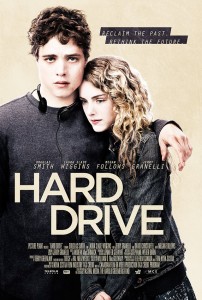The word “incompetent” is usually associated with low intelligence. In the case of Hard Drive, I think the melodrama is outrageously incompetent, but I don’t think its writer/director William D. MacGillivray is stupid.
MacGillivray’s achievements were attached to the press notes, and there’s enough proof in the pudding to make me believe he ain’t no dummy. The filmmaker has been attached to projects that have earned him acclaim, Canadian credibility, and a Governor General’s Award in Visual and Media Arts.
Hard Drive is my first foray into the work of MacGillivray, so it helps to know his earlier work shows proof of someone with their head on straight. Without these points of reference, I would seriously ask the filmmaker to give his head a shake.
Hard Drive is one of those fascinating failures. It’s a feature that’s so out of touch, you aren’t too sure if it’s overshooting its target or withholding too much.
MacGillvray is aiming to materialize an off-beat coming-of-age tale between two teens with different head spaces, yet can relate because of how distant they are from everyone else. Their names are Ditch and Debs (played by Douglas Smith and Laura Slade Wiggins) and the film too frequently hammers in their opposites.
Case in point: he listens to a walkman, she listens to .mp3’s. There’s a moment where Ditch hands Debs a mixed cassette tape. When she asks what she’s supposed to do with it, Ditch responds, “you listen to it.” Jokingly, she holds the tape up to her ear and giggles. The audience – in unison – rolls their eyes.
Ditch is a hipster down to the skinny jeans and the film’s cloying indie soundtrack. Debs, on the other hand, is basically a pixie, who’s carefree and acts as a force to shake up Ditch’s dull world.
MacGillvray’s different take on teen romance and quirky style goes according to his plan. Smith and Wiggins have cute moments at the drop of a hat, and then they do something strange. But, because they both welcomely do it, it’s supposed to add to the bubbly tone. Ditch and Debs have a “thing” where they turn to each other and touch tongue tips. Again, in unison, our eyes get another workout.
Hard Drive follows this formula for a long time. We watch Ditch come out of his shell, and see how a trusting relationship allows Debs to open up. However, MacGillvray’s dialogue doesn’t sound natural or authentic. Whether they’re quirky or not, he doesn’t know how modern teenagers talk to each other. This means the performances by Smith and Wiggins don’t rise above mediocrity because there’s nothing to believe in.
Adult actors are affected as well. For instance, Megan Follows (made famous by her role on Anne of Green Gables) plays Ditch’s mom. Since her son doesn’t have any believability, Follows has difficulty making the mother figure into anything worthwhile. She can show affection towards family, but there’s not much else.
MacGillvray eventually includes heavier development thats adds to Debs’ hostility. It comes late, but we appreciate the notion by the film wanting the audience to care more. So much of it is crowbarred in though, and then laboriously handled to get through to a satisfying conclusion. It only comes across as messy.
Hard Drive is a coming-of-age film in the sense that two young leads go from being unlikable to being somewhat tangible. But, other than that, there’s a whole lot of MacGillvray playing up Ditch’s mopey attitude and Debs’ cutesy enthusiasm. It’s a film that has no realization towards time as it clumsily switches from day to night. It’s a movie that has a heavy handed percussion-based score, and an editor who is forced to make graceless transitions. Only in Hard Drive will you find sexual intimacy crossfade into a drum solo.
I haven’t seen William D. MacGillivray during his finest moments, and even I know that Hard Drive isn’t showing what the filmmaker is capable of.




Be the first to comment